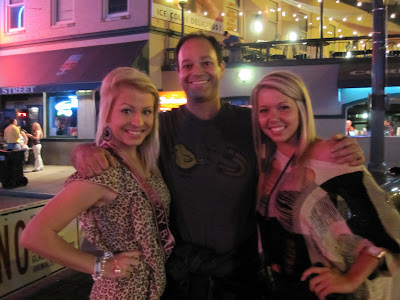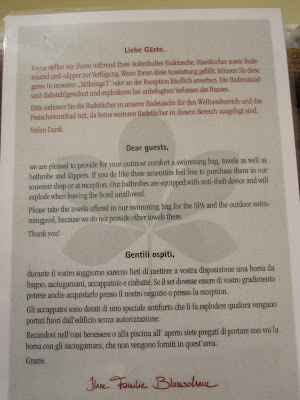I left Graz in October during the height of Sturm season there. The locals also call Sturm Jungwein, or young wine, reflecting that it is basically partly fermented wine. It is popular, especially among tourists, but very temporary, because it is heavily carbonated and cannot be stored or transported well. This continues to surprise me as a particularly atypical engineering failure. The Austrians, who are good engineers and quite experienced with their creative drinks, have not figured out any way to bottle Sturm. I tried buying some to bring to America, and nobody knew where to get any. I thought about taking some anyway, but then my picture of all the loot from my Memphis hotel I had a few entries ago would have been splotched with detonated wanna-be wine.
I got back to Graz a few days ago. No more Sturm anywhere, and the day of my arrival (18 Nov) happened to be the opening night of glühwein. Hauptplatz was way too crowded to get any, and they shut down at 10 PM, which seems unEuropean. The locals love their creative wine aberrations. I heard they even drink wine sometimes.
So do passengers on international flights, where Lufthansa still serves free alcoholic drinks on international flights. Their Star Alliance partner, United, does not. However, they account for their wine about as well as the Greek government tracks its taxes. Routinely, I buy one or two wine bottles and get the rest free, through cajoling and charm and bartering. Simply ask your flight attendant for some extra wine. Initially, he will say no, just as sure as he’s gay. Then, go to the bathroom when he’s hanging out in the back galley. Give him a couple Mozartkugeln, pee, and get ready for a free bottle upon your bathroom exit. Works every time. This time, I gave one of them a little bottle of obstler that I carried on, figuring it wouldn’t be a good stomachpartner for wine. The guy got me a full glass of wine from the first class cabin, which was dramatically better than the bottles they sold me in coach. Yeah, I was surprised too. Not at the wine, but that I still had obstler after 5 weeks in the US.
But I just experienced a far greater drinking indignity, a new low in airline exploitation. I was asked if I wanted a drink on my short flight from Munich to Barcelona. Sure, I said. Water. I even asked in Spanish. I got water and put my headphones on, thinking the transaction was over. No. She wanted 2 euros. Never had to pay for an on-board non-alcoholic beverage before. Que lastima, Spainair. I was reminded of my post a while back, inspired by the suggestions for airline stretches in United’s Hemispheres magazine, helpfully suggesting further stretches. Although they really should pay me for this, here are some further suggestions on how to profit from airline passengers.
First, they missed some key parts of the food and drink selling cycle. The menus are free. Why? They cost several cents to print. So did the emergency instructions, inflight catalog, and magazine. Spanair did not give out any pretzels or nuts, and if they tried to hand me any, I would now ask how much they cost. There’s an opportunity. And what happens later? Passengers go to the bathroom, particularly on longer flights. What about inflight pay toilets? It costs $10 grand to smoke in an airplane lavatory, so who could complain about paying only one percent of that to perform a much more private and disgusting act? To discourage cheap passengers who won’t shell out $100 per use, you could also remove the air sickness bags, or charge a reduced price for them, thus depriving niggardly innovators of a backup option.
Inflight movies are still free. So is the music, and the headphones. Missed opportunity. Similarly, the flight attendants on this flight will speak to me – in any of three languages – for free, and even smile on occasion, making me wonder if I said something witty or they just have to fart. Make passengers pay for their interactions with staff, and charge a lot more if the plane is delayed or suddenly losing altitude. Since trilingual passengers are rare, charge extra for speaking in the passenger’s native language, or even one that he knows. The traytables and seatbacks could both have electronic locks keyed to a credit card. Charge ten cents per minute they’re open, and hope the passenger falls asleep. Above me, I have a light and air vent that I can use for free. I can even close the window for free, which really helps me sleep. They could get a whole package for sleeping people, with a discount if you get the window turndown service and earplugs. Sleepy passengers also need pillows and blankets. Charge $5000 for each inch of blanket thickness, or $5.
They’ve been charging for better seat assignments for a few years now. Tall men can recall the good ol’ days when an exit row seat on an international flight didn’t cost an extra 60 euros. But I can still get an aisle seat without an extra fee, which is a loophole they need to close. Some people still like window seats, and might be goaded in to paying for them. Middle seats could also incur a surcharge. Are there other kinds of seats? Charge for them too. Passengers have to put their carryons in an overhead bin, or under a nearby seat. Prime storage space, given away for free, like a horny off-duty whore. And what about the shuttles that take me to and from the terminal? Without them, passengers are stuck. You may have read the articles about how a couple airlines made passengers pay for gas and airport fees while they were stuck in a terminal between connecting flights. Good move, but wouldn’t they pay more if they didn’t have a whole terminal with food, bathrooms, heaters, and seats?
Heat. Of course. It must cost a lot to heat an aircraft hurtling through the lower atmosphere. Let alone the air circulation. Get ready for this new line: in the event of emergency, or a loss of cabin pressure, air masks will automatically drop from the overhead areas if your credit card is valid. Note that cabin pressure will drop below safe levels within ten minutes after takeoff. All electronic devices must remain off until the captain has turned off the fasten seat belt sign, and you paid a corkage fee to open your laptop. Please remain in your seat, with your seat belt securely fastened, in case of unexpected or fabricated turbulence. If your seat belt will not fasten, or unfasten, please ensure your credit card is valid to accept the belting charges. In the event of emergency, your seat cushion may be used as a flotation device for $50, which is the same price required to use your seat cushion as a seat cushion.












































